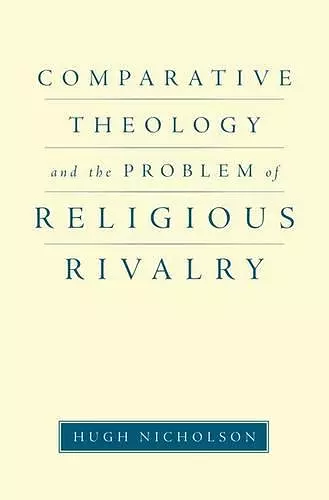Comparative Theology and the Problem of Religious Rivalry
Format:Hardback
Publisher:Oxford University Press Inc
Published:25th Aug '11
Currently unavailable, and unfortunately no date known when it will be back

In theological discourse, argues Hugh Nicholson, the political goes "all the way down." One never reaches a bedrock level of politically neutral religious facts, because all theological discourse - even the most sublime, edifying, and "spiritual"--is shot through with polemical elements. Liberal theologies, from the Christian fulfillment theology of the nineteenth century to the pluralist theology of the twentieth, have assumed that religious writings attain spiritual truth and sublimity despite any polemical elements they might contain. Through his analysis and comparison of the Christian mystical theologian Meister Eckhart and his Hindu counterpart ÍaSkara, Nicholson arrives at a very different conclusion. Polemical elements may in fact constitute the creative source of the expressive power of religious discourses. Wayne Proudfoot has argued that mystical discourses embody a set of rules that repel any determinate understanding of the ineffable object or experience they purport to describe. In Comparative Theology and the Problem of Religious Rivalry, Nicholson suggests that this principle of negation is connected, perhaps through a process of abstraction and sublimation, with the need to distinguish oneself from one's intra- and/or inter-religious adversaries. Nicholson proposes a new model of comparative theology that recognizes and confronts one of the most urgent cultural and political issues of our time: namely, the "return of the political" in the form of anti-secular and fundamentalist movements around the world. This model acknowledges the ineradicable nature of an oppositional dimension of religious discourse, while honoring and even advancing the liberal project of curtailing intolerance and prejudice in the sphere of religion.
This book is going to disrupt (I expect) and redirect (I hope) the contemporary, often contorted, discussion on how scholars and/or believers are to deal with religious diversity. In a carefully crafted, broadly informed argument, Nicholson sounds his warning that whether one is a scholar of religious studies or a comparative theologian, to neglect the political element in all religious identities is to imperil not only oneself but the religious other. Nicholson's theoretical case is made all the more convincing when he applies it to a creative and exciting analysis of Rudolf Otto's classic Mysticism East and West. This book will be much talked about. (I'm sure). * Paul F. Knitter, Paul Tillich Professor of Theology, World Religions, and Culture, Union Theological Seminary, New York *
ISBN: 9780199772865
Dimensions: 165mm x 236mm x 31mm
Weight: 638g
344 pages